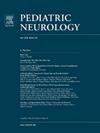IMPAIRED CEREBRAL AUTOREGULATION IN CHILDREN
IF 3.2
3区 医学
Q2 CLINICAL NEUROLOGY
引用次数: 0
Abstract
Managing acute brain injury involves protecting the brain from secondary injury by addressing the mismatch between metabolic demand and cerebral perfusion. Observational studies have associated impaired cerebral autoregulation, a physiological process governing the regulation of cerebral blood flow, with unfavorable neurological outcomes in both pediatric and adult populations. We review the pathophysiology of cerebral autoregulation and discuss methods for assessing and monitoring it in children after acquired brain injury. We also examine the current research investigating the relationship between impaired cerebral autoregulation and outcomes following traumatic brain injury, cardiac arrest, cardiopulmonary bypass, and extracorporeal membrane oxygenation. Furthermore, we outline potential areas for future research in cerebral autoregulation and its clinical implications for pediatric patients with brain injuries.
儿童大脑自我调节功能受损
处理急性脑损伤包括通过解决代谢需求和脑灌注之间的不匹配来保护大脑免受继发性损伤。观察性研究表明,在儿童和成人人群中,脑自调节功能受损(脑血流调节的生理过程)与不利的神经系统预后相关。本文综述了后天性脑损伤后脑自动调节的病理生理学,并讨论了评估和监测脑自动调节的方法。我们还研究了目前关于创伤性脑损伤、心脏骤停、体外循环和体外膜氧合后脑自动调节功能受损与预后之间关系的研究。此外,我们概述了未来脑自动调节研究的潜在领域及其对儿童脑损伤患者的临床意义。
本文章由计算机程序翻译,如有差异,请以英文原文为准。
求助全文
约1分钟内获得全文
求助全文
来源期刊

Pediatric neurology
医学-临床神经学
CiteScore
4.80
自引率
2.60%
发文量
176
审稿时长
78 days
期刊介绍:
Pediatric Neurology publishes timely peer-reviewed clinical and research articles covering all aspects of the developing nervous system.
Pediatric Neurology features up-to-the-minute publication of the latest advances in the diagnosis, management, and treatment of pediatric neurologic disorders. The journal''s editor, E. Steve Roach, in conjunction with the team of Associate Editors, heads an internationally recognized editorial board, ensuring the most authoritative and extensive coverage of the field. Among the topics covered are: epilepsy, mitochondrial diseases, congenital malformations, chromosomopathies, peripheral neuropathies, perinatal and childhood stroke, cerebral palsy, as well as other diseases affecting the developing nervous system.
 求助内容:
求助内容: 应助结果提醒方式:
应助结果提醒方式:


